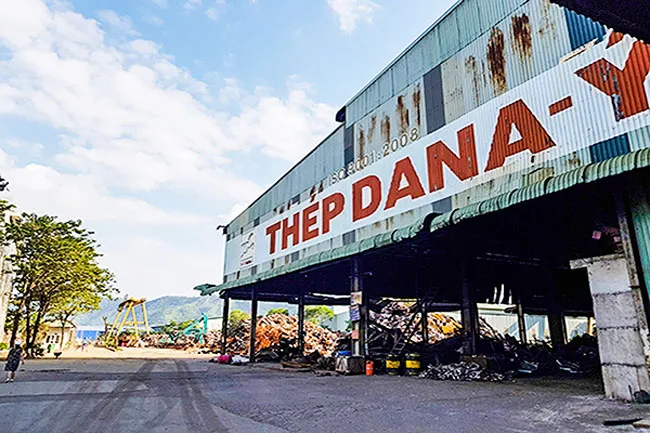
Leading enterprise
The forerunner to DNY was the Thanh Loi Joint Stock Company, which had been in the business of steel production for twenty years. In 2008, the Thanh Loi Steel Joint Stock Company was equitized and it transferred its No. 4 steel production facility to establish the Da Nang-Italy Steel Joint Stock Company. On 30 June 2009, the Da Nang-Italy Steel Joint Stock Company officially changed its name to DANA-Steel Joint Stock Company-Italy. At the time of establishing, DNY charter capital was at VND 150 bn, with capital contribution of 87 institutional and individual investors. In 2010, DNY increased its charter capital from VND 150 bn to VND 200 bn. By the end of 2013, DNY paid dividends by shares and issued bonus shares to shareholders, raising its charter capital even further to VND 270 bn.
It is said that the capital raising activities by issuing shares was quite easy for DNY, because at that time, DNY was a huge steel enterprise with strong market share in the Central region and Central Highland region of Vietnam. DNY also had two manufacturing plants, a steel refining factory with capacity to produce 150,000 tons of billet per year and a steel mill with capacity to produce 120,000 tons per year. In the Central region market, DNY accounted for about 50% market share in steel products and in the first year of production, DNY achieved VND 642 bn in revenue and VND 78 bn in after tax profits. Gross margin for DNY was upto 17%, this being the highest level compared to other steel construction enterprises, and the ratio of after tax profit on equity (ROE) was 43%, ranking DNY third among all steel enterprises. The company position as a leading enterprise was further strengthened when DNY put 15 million shares on the HNX, in trading session on 11 May 2010 at closing price of VND 54,800 per share.
Causing environmental pollution
After a strong breakthrough period, DNY began to face accusations of illegal dumping of toxic waste water and slag, and releasing untreated fumes and dust into the environment, and as a result production and business activities in the steel company were seriously affected. In February 2018, hundreds of households gathered in front of the DNY plant to protest against environmental pollution, which then led to local authorities having to shut down the DNY plant. This aggressive reaction of the local residents proved detrimental for the company, but with DNY not complying with environmental regulations, authorities called for total suspension of production.
In addition, DNY was fined VND 390 mn and production was suspended for a period of six months. The closure of operations saw DNY suffer huge losses in 2018, a drop of VND 112 bn. This loss worsened in 2019, with negative profit of nearly VND 358 bn. DNY then subsequently continued to report losses of VND 44 bn in the first quarter of 2020, bringing total accumulated losses by 31 March to VND 418 bn, while the equity also recorded a negative result of around VND 126 bn.
However, even though environmental irregularities were a strong reason for DNY to suffer losses, production and business activities in the company were also showing signs of regressing over the years due to fierce competition from imported steel. Added to this, Thailand and Malaysia initiated anti-dumping lawsuits on some iron and steel products originating from China and brought into Vietnam. Steel prices in the world market also saw unpredictable fluctuation and raw material prices were constantly fluctuating, which all added to DNY woes.
Depreciation in value
In 2019, DNY financial statement report was rejected by the auditor, Auditing and Accounting Company Ltd (AAC), which questioned the actual value of recorded assets as of 31 December 2019. AAC said that it was impossible to collect appropriate evidence about the existence of the entire value of inventory, which was valued at nearly VND 489 bn at the end of 2019. Besides VND 489 bn in inventories, further assets of DNY included nearly VND 398 bn in tangible fixed assets, and VND 297 bn in incomplete construction costs that have either rusted or deteriorated.
Therefore, the audit company noted that figures on the financial statement were still figures based on the original book value, without any adjustments to depreciation in value, and therefore the audit company could not quantify the actual value of all assets. AAC stated they were unable to collect sufficient and appropriate evidence and therefore unable to provide an opinion on the attached financial statements, emphasizing that the financial health of DNY depended on whether banks, related parties and shareholders would be willing to provide credit or financial support in the next 12 months.
AAC’s refusal to share opinion on the financial statements of 2019 was the reason why HNX decided to cancel the mandatory listing of DNY from 5 June. This information gives DNY no credibility to resist selling pressure from investors. Currently, DNY is trading below VND 2,000 per share.




















